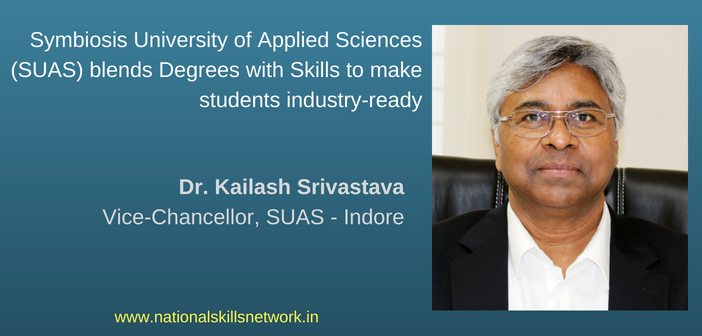Symbiosis University of Applied Sciences (SUAS), Indore, has set many new trends in combining traditional curriculum with dynamic knowledge and skills that are needed in the industry. Course offered by SUAS are aimed at enhancing the employability of students for jobs in India and abroad. In this Skill Story, Dr. Kailash Srivastava, Vice-Chancellor, SUAS tells us about the significance of industry-integrated learning and how the university is all set to prepare the students for future work and technology.
Q: Why did SUAS feel the need to introduce courses in ‘Applied Sciences’ and what is the market size? How are you integrated these courses with better employability and promoting entrepreneurship?
A: Symbiosis University of Applied Sciences (SUAS), Indore is the first of its kind institution to offer innovative degree programs that address the demands of the industry for job-ready professionals. We have aligned our programs with Skill India Mission to reap the demographic dividend by making graduates employable. As a Skill University, our vision is to skill India through higher education. This automatically brings in the need to focus on industry-relevant curriculum by engaging in sustained interaction with various industry segments, with provision for student internships and long-term project work. SUAS caters to many high-growth industry sectors like BFSI, Retail, e-Commerce, Computer Science and Information Technology (CSIT), Automobile Engineering and Mechatronics.
Combining the traditional degree program with job-specific skills need a focus on outcome-based learning. We have integrated this in our curriculum through alignment with the National Skill Qualification Framework (NSQF), being the first university was the first to adopt this philosophy, prepare students for jobs in India as well as international placements.

Q: Combining higher education with skills – how is Symbiosis (SUAS Indore) achieving this goal through various degree programs? What changes have you made to teaching practices, pedagogy, faculty development etc.
A: Our curriculum is designed by industry experts and our outstanding faculty members who have considerable industry and research experience. We have collaboration with many universities around the world and keep ourselves engaged with them to evolve our curriculum as per international requirements. Our aim is to produce industry ready skillful professionals who can start working productively from the instant they join the industry. We focus less on “chalk and talk” component and more on hands-on experiential learning i.e. skill, practical and tutorials. We typically devote 30% of the time to the theoretical component. The rest goes to important things that makes them future ready.
Q: How are you creating awareness among students about industry-integrated skill-based courses and how has been the response?
A: Our curriculum is oriented towards an overall development of each student. We offer various credit and non-credit courses that would help shape their career and make them employable from the moment they are hired. We have many industry partners who regularly visit our campus and advise us how we can do better to shape future generations. We believe “placement opportunities” are just the byproduct of our overall efforts at the university.
Q: What about industry collaboration? How do you sustain their engagement in various stages like curriculum design, practical hands-on exposure, guest faculty, industry visits, assessments etc
A: Our University is equipped with industry machinery, learning factories, skill center and workshops that are unmatched and can be found only in industry. Our pedagogy involves working on machines that are the most contemporary machines one will find in the sector. Hence our graduates get the industry skills during their stay at SUAS and become productive right from day one.
Q: Tell us about the infrastructure at SUAS, since any skill-based, vocational course is highly dependent on investments in latest technology and tools.
We have established tie-ups with different industries .Our industry partners not only setup workshops and skill centers for our students but also participated in academics by training our teachers, conducting joint training programs for their own staff as well as helping us to enhance our curricula to align with industry needs.
Q: What has been the parents’ response to innovative skill based courses, do they encourage the students?
A: Basic graduation is old as it leads a student to nowhere in this competitive world. Add-on and skill based courses are more in demand. Even parents are worried about the career of their children and take things seriously.
It is time to start building awareness highlighting the career opportunities that skill based education would offer in the present global market. It is therefore time for students, parents, authorities on their part to understand the importance of vocational education and take the necessary steps towards adopting skill based education. This could in turn work as a solution for the large unemployed labour market of India and therein help propel the country towards better progress and prosperity.
Disclaimer: The content (text, pictures, videos, slideshows and audio) are provided and approved for publishing by the client who is featured in this article. National Skills Network – NSN is not responsible for any copyright or related issues with any such type of content.













This my interaction with such initiative, which aims high and is led by visionary industrialists, educationists and experts in the field. The short term as well as long term results will speak louder about the initiative and will largely be determined by students who take these courses . The initiative will certainly be rwarding experience and is need of the time in our country. Best wishes.
Hi Mukund, thank you for sharing your view.